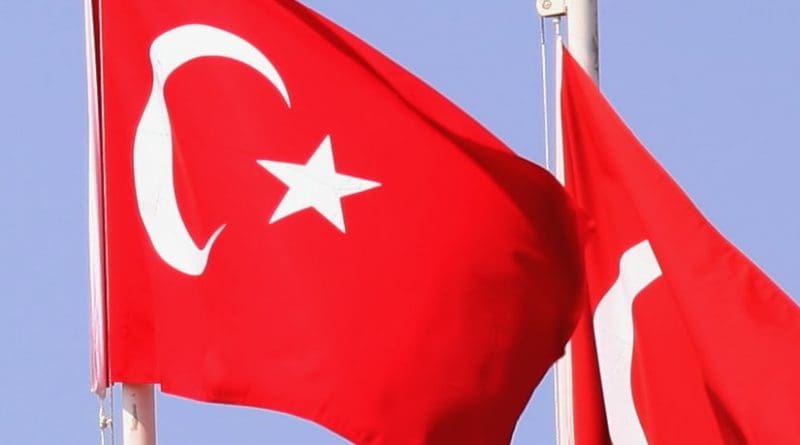Stepping Up Sanctions: Arab And Turkish Pressures On Syria – Analysis
The Muslim Brotherhood (MB) is looking to Turkey rather than the United States and Europe to intervene militarily to stop the Assad regime’s violent suppression of a nine-month-old rebellion. In meetings with Turkish officials, the leader of the MB, Mohammad Riad Shakfa, and representatives of the Syrian National Council have urged Turkey to enforce a no-fly zone above Syria and, if military intervention becomes unavoidable, they want Turkey to take the lead.
Turkey is already providing tacit support to the rebel Syrian Free Army, which has a camp on the Turkish side of the border and in recent days has staged more deadly attacks on Syrian military targets. Turkey has also allowed the political opposition to use Istanbul as a base.
Turkish Dilemma
Nonetheless, despite Prime Minister Recep Tayyip Erdogan’s increasingly emotional denunciations of the Assad regime, Ankara is finding it difficult to step up the pressure on Syria without risking Turkish interests in the short term. Turkey’s reluctance so far to impose sanctions of its own when the Arab League is about to step up to the plate, risks its losing the moral high ground it achieved in part by taking the lead in condemning the Syrian crackdown and demanding that Israel lift its blockade of the Gaza Strip.
Erdogan has so far been long on rhetoric and short on actions, partly because of differences between the government and the military. While Erdogan describes Syria’s crisis as Turkey’s “internal problem”, army chief of staff General Necdet Ozel recently insisted that it was “primarily the internal problem of that country”. As a result, Erdogan, in addition to holding back on sanctions and dropping plans to create a humanitarian buffer zone on the Turkish-Syrian border, has yet to fulfill his promise to visit camps for Syrian refugees in eastern Turkey.
Turkish officials fear that imposing sanctions, let alone overt military intervention, could open Pandora’s Box with Syria and its ally Iran; Tehran could be pushed to increase its support for the Turkish Kurdish Workers’ Party (PKK) that has already stepped up its attacks on military targets in southeastern Turkey. In return, Turkey would have to step up its retaliation against PKK bases in northern Iraq and support unrest in some of Iran’s more restive provinces such as Eastern Azerbaijan whose majority Turkic population resents Persian rule. All in all, the crisis in Syria would risk becoming a regional conflagration.
The Arab League’s new assertiveness in Syria offers Turkey a way out of its dilemma and could help increase the pain level of sanctions to a degree that may bring Assad to the negotiating table. The Syrian leader has so far rejected Arab calls for a halt to the violence and has shown disdain for the League’s plan to impose sanctions of its own and taking Syria to the United Nations Security Council.
Worsening economy
Nonetheless, Arab and Turkish sanctions would boost those already enforced by the US and Europe on Syria’s banking and oil sector; halt imports of non-oil products from Syria, which constitute the bulk of the country’s exports; shut down one of Syria’s last links to the international banking network; and prevent its government and businesses from opening letters of credit.
Oil production is dropping as Syria finds it increasingly difficult to find buyers for its 140,000 barrels of crude oil per day and has been unable to pay oil majors Shell and Total for their production. As a result, petroleum products such as diesel for heating are becoming scarce and Syria increasingly cannot foot its bill for imports. Syria’s state-owned oil company Sytrol last week cancelled a tender for the sale of 50,000 tonnes of fuel because of a lack of buyers. Swiss refiner Petroplus announced that it had replaced Syrian oil with Iraqi product. Government and private investment moreover has come to a halt, tourism has evaporated, industrial production is down, agriculture is impeded by military operations and unemployment has jumped to 25 per cent.
China has already expressed support for the Arab League’s pressure on Syria. Arab and Turkish sanctions would make it more difficult for Russia and India in particular as well as Western companies that supply and maintain Internet surveillance systems in Syria to spoil the game. The sanctions may not be enough for the regime to crumble, but they would be sufficient to force it to look for a political rather than a military solution that could drag the region into a war.
More than symbolic act
To be sure, making Turkish and, even more so, Arab sanctions stick could be easier said than done. Banks in Lebanon, the pillars of the Lebanese economy, are likely to be reluctant to apply the sanctions, arguing that they would have to violate the country’s stringent privacy laws. The government is unlikely to want to rock either its economic boat or relations with its big brother neighbour.
Nevertheless, the chances of Syria becoming a rare case where sanctions work are enhanced by the fact that the planned sanctions enjoy the support of significant parts of the population. They have, however, so far failed to create a sense of unity against a common enemy that is responsible for people’s misery. In fact, it is Syrians opposed to the Assad regime that are demanding tougher sanctions and tougher actions. For once, tough sanctions applied by a majority of the international community could constitute more than a symbolic act and avert the risk of a military conflict that escalates into regional war.
This article was published by S. Rajaratnam School of International Studies (RSIS), Nanyang Technological University

